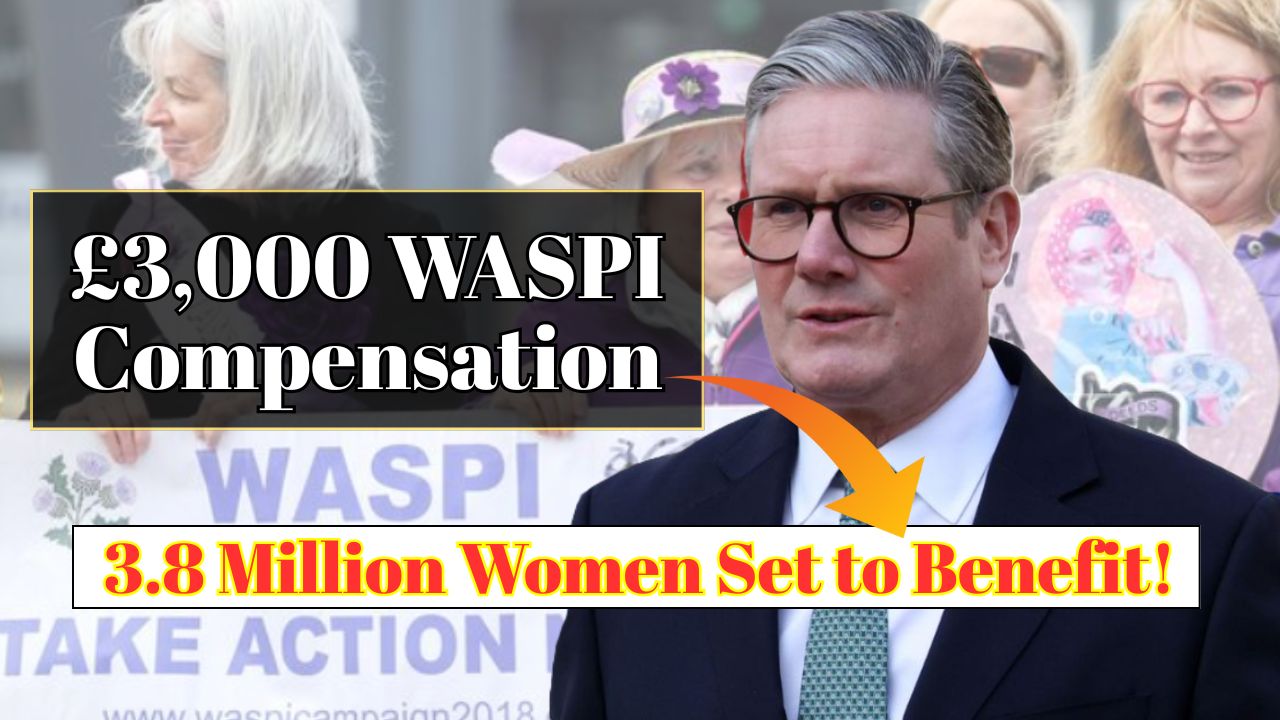£3000 WASPI Compensation Coming Soon: The Women Against State Pension Inequality (WASPI) campaign has been fighting for justice for women born in the 1950s who had their state pension age changed with little to no notice. After years of campaigning, the Parliamentary and Health Service Ombudsman (PHSO) found that the Department for Work and Pensions (DWP) was guilty of maladministration. As a result, compensation payments of approximately £3,000 are expected to be distributed to eligible women in 2025.
| Key Information | Details |
| Expected Compensation | Approximately £3,000 per eligible woman |
| Timeline | Payments expected to begin in 2025 |
| Eligible Women | Those born in the 1950s affected by pension age changes |
| Total Affected | Approximately 3.8 million women |
| PHSO Finding | DWP guilty of maladministration in communicating changes |
| Current Status | Awaiting final implementation details from government |
The Long Road to Recognition
The journey to secure compensation for WASPI women has been arduous. For more than a decade, these women have fought tirelessly to have their voices heard and their grievances addressed. Born in the 1950s, many had planned their retirement based on the expectation that they would receive their state pension at age 60, only to discover – often with insufficient notice – that legislative changes had increased their pension age to 65 or 66.
The lack of proper notification left many women in financial hardship, with insufficient time to make alternative arrangements for their retirement. Some had already left their jobs, others had turned down promotions or reduced their hours, and many had made significant life decisions based on their expected retirement date.
The WASPI campaign was formed in 2015 to fight for fair treatment for these women. They never opposed the equalization of state pension ages but argued that the way the changes were implemented was unfair and caused unnecessary hardship.
The PHSO Investigation and Findings
The Parliamentary and Health Service Ombudsman launched an investigation into the matter following numerous complaints. In a landmark decision, the PHSO concluded that the DWP was guilty of maladministration in its handling of the state pension age changes.
The investigation found that the DWP failed to adequately communicate the changes to affected women, giving them insufficient time to adjust their retirement plans. This lack of proper communication was deemed to constitute maladministration.
The PHSO recommended that the government should acknowledge the injustice and provide appropriate compensation to the affected women. While the full recommendations were not immediately implemented, momentum has been building toward a resolution.
$2450 Cash Boost for Working Men in New CPP Overhaul?
Australia’s $1000 Youth Allowance in 2025: Check Eligibility, How to Apply and Payment Dates!
The £3,000 Compensation Package
After years of uncertainty, there is now growing confidence that a compensation package will be delivered in 2025. The anticipated amount of approximately £3,000 per eligible woman represents a recognition of the hardship and injustice they have faced.
While this amount falls short of what many campaigners had hoped for, it represents a significant step forward in acknowledging the unfair treatment these women experienced. The total cost to the government is estimated to be around £10 billion if all eligible women receive the compensation.
It’s important to note that the £3,000 figure is an average amount, and the actual payment may vary depending on individual circumstances and the final implementation details of the scheme.
Who Qualifies for the WASPI Compensation?
Women born in the 1950s who were affected by the changes to the state pension age are potentially eligible for compensation. This includes approximately 3.8 million women who had their state pension age increased from 60 to 65 or 66 with inadequate notice.
Eligibility criteria are expected to include:
- Born between April 6, 1950, and April 5, 1960
- Affected by the state pension age changes introduced by the 1995 and/or 2011 Pensions Acts
- Not adequately informed about these changes by the DWP
The exact criteria and verification process are still being finalized, but these are the general parameters that are expected to apply.
The Timeline to Compensation
The road to compensation has been long and complex:
- 1995: The Pensions Act equalizes state pension age for men and women at 65
- 2011: The state pension age increase is accelerated
- 2015: WASPI campaign forms
- 2018: The PHSO begins its investigation
- 2021: PHSO finds the DWP guilty of maladministration
- 2023: Full PHSO report with compensation recommendations published
- 2024: Government commits to implementing PHSO recommendations
- 2025: Expected start of compensation payments
This timeline represents a two-decade struggle for justice, with affected women waiting years for recognition of the unfair treatment they received.
The Impact of Inadequate Notice
The impact of the pension age changes with inadequate notice has been profound for many women. Without sufficient time to prepare for a later retirement, many faced serious financial consequences:
- Some had to continue working for several more years than planned
- Others had to rely on savings that were meant for other purposes
- Many faced difficulty finding employment in their 60s
- Some were forced to claim working-age benefits for the first time in their lives
- Health issues prevented some from working longer, leading to severe financial hardship
The emotional toll has also been significant. Many women felt betrayed by a system they had contributed to throughout their working lives, only to have the rules changed at the last minute.
Singapore $3267 WIS Payment 2025: Eligibility, Monthly Dates & Full Guide
$600 Centrelink Cash Boost 2025 – Everything You Need to Know for April
Government Response and Implementation Plans
The government’s response to the PHSO’s findings has evolved over time. Initially, there was resistance to the idea of compensation, with concerns about the cost to the taxpayer and the precedent it might set.
However, as political pressure mounted and the justice of the WASPI women’s case became increasingly clear, the government’s position shifted. By late 2024, there was a firm commitment to implementing the PHSO’s recommendations and providing compensation.
The implementation plan for the £3,000 payments includes:
- Establishing a dedicated team within the DWP to process claims
- Creating a streamlined verification process to confirm eligibility
- Developing a secure payment system
- Setting up a helpline and support services for affected women
These steps are designed to ensure that the compensation is delivered efficiently and fairly.
The Broader Implications of the WASPI Case
The WASPI case has implications beyond the immediate issue of compensation for affected women. It raises important questions about:
- Government communication: How should significant changes to welfare and pension entitlements be communicated?
- Fairness in policy implementation: What constitutes a reasonable transition period when making changes that affect people’s financial futures?
- Gender equality: Are there still hidden inequalities in the pension system that need to be addressed?
- Trust in government: How can trust be maintained when implementing necessary but potentially unpopular changes?
These questions will continue to be debated long after the compensation payments have been made.
How to Claim Your Compensation
While the exact process for claiming compensation is still being finalized, WASPI women are advised to:
- Gather evidence of their date of birth and National Insurance contributions
- Document when and how they were informed of the pension age changes
- Register interest through the official WASPI website or DWP portal
- Stay informed about developments by following official channels
- Be wary of scams – all official communication will come through recognized government channels
The DWP is expected to launch a dedicated website and helpline in early 2025 to guide women through the claims process.
Beyond Compensation: Ongoing Pension Issues
While the £3,000 compensation represents progress, it doesn’t resolve all the issues facing older women in the UK pension system. Other ongoing concerns include:
- The continuing gender pension gap, with women receiving less pension on average than men
- The adequacy of the state pension for those without significant private pension provision
- The impact of caring responsibilities on women’s pension accumulation
- Access to good quality financial advice for retirement planning
These issues suggest that while the WASPI campaign has achieved a significant victory, there is still work to be done to ensure fairness in the pension system.
Lessons Learned from the WASPI Campaign
The success of the WASPI campaign offers several lessons for both policymakers and individuals:
For policymakers:
- The importance of clear, timely communication when making significant policy changes
- The need to consider the real-world impact of transition arrangements
- The value of listening to affected groups and responding to their concerns
For individuals:
- The power of collective action and persistent advocacy
- The importance of understanding your pension entitlements
- The need to stay informed about policy changes that might affect your financial future
These lessons may help to prevent similar situations from arising in the future.
Looking Forward: What’s Next for WASPI Women?
Once the compensation payments begin in 2025, what does the future hold for WASPI women and their campaign?
Some aspects to consider:
- Ongoing advocacy: The WASPI campaign may continue to push for higher compensation amounts
- Support services: Additional support may be needed to help women maximize their remaining pension provision
- Legacy: The campaign’s impact on pension policy and government communication practices
- Community: The networks and friendships formed during the campaign may continue to provide mutual support
The WASPI campaign has created a powerful community of women who understand the importance of standing up for their rights, and this legacy may prove as valuable as the financial compensation itself.
Conclusion
The expected £3,000 WASPI compensation coming in 2025 represents a significant milestone in a long-fought campaign for justice. While it may not fully compensate for the hardship experienced by the affected women, it acknowledges the maladministration that occurred and provides some financial redress.
For the 3.8 million women affected, this compensation is not just about the money – it’s about recognition of the unfairness they experienced and vindication of their campaign. As we look toward 2025 and the implementation of the compensation scheme, the determination and perseverance of the WASPI women stand as a testament to the power of collective action and the importance of standing up against injustice.
The journey has been long, but for many WASPI women, the £3,000 compensation will represent the culmination of years of campaigning and a step toward closure on a difficult chapter in their lives.







